Forbidden Love
Forbidden Love
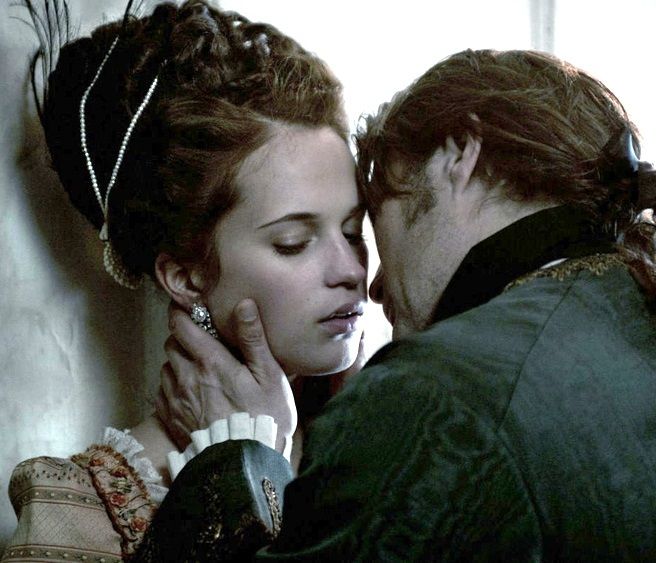
(royal007b.jpg)

(heart121.gif)
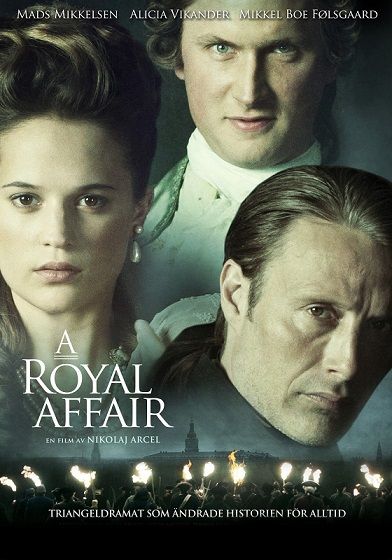
(royal009.jpg)

(diane02.gif)
Kato, are you involved in a forbidden love?

(kato3.gif)
Yes, I am. What would you say?
Are you really, really getting into such an extraordinary affair?
What if I'm really absorbed in the kind of love that is, you belive, absolutely unacceptable socially?
Well ..., we're living in a free society and I'm reasonably open-minded. So I might as well treat you as a friend, as I always did.
I'm glad to hear that, but I'm just joking. he, he, he, he, he... Actually, I borrowed a DVD from Vancouver Public Library and saw a movie about a forbidden love, which is called "A Royal Affair."

(lib41125a.png)
■"Actual Catalogue Page"

I see... So you borrowed the DVD marked as "624" in the above list, huh?

Yes, that's right.
Are you saying, that's the 624th movie you viewed in the library?
Yes, I am. Here are some details about the movie.

(lib41125b.png)
■"Actual Catalogue Page"

So, you jotted down your comment after viewing it on November 18, huh?

Yes, I did.
There're still four people waiting for the DVD, aren't there?
Yes, you're telling me, Diane.
Kato, tell me about the movie.
Well..., it is based on the true story.

(royal001.jpg)

The passionate and forbidden romance between the mad Danish King, the royal physician, and the young but strong-willed Queen leads to a revolution that changes an entire nation.

...sounds quite interesting.
Have you ever heard of Christian VII of Denmark, Diane?
Is he the mad Danish King?
I don't think he was really a mad king, but they say he was.
Christian VII of Denmark
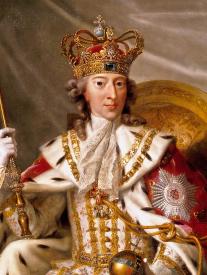
(chris7.jpg)
(29 January 1749 – 13 March 1808)
Christian VII was an Oldenburg monarch who ruled as King of Denmark and Norway and Duke of Schleswig and Holstein from 1766 until his death.
He was the son of King Frederick V and his first wife Louise of Great Britain.
Christian VII's reign was marked by mental illness which affected government decisions, and for most of his reign Christian was only nominally king.
His royal advisers differed depending on who won power struggles around the throne.
In the late 1760s, he came under the influence of his personal physician Johann Friedrich Struensee, who rose steadily in power.
From 1770 to 1772 Struensee was "de facto" regent of the country, and introduced progressive reforms signed into law by Christian VII.
Struensee was deposed by a coup in 1772 after which the country was ruled by Christian's stepmother, Juliane Marie of Brunswick-Wolfenbüttel,
his half-brother Frederick and the Danish politician Ove Høegh-Guldberg.
From 14 April 1784 until Christian VII's death in 1808, it was Christian's son, later Frederick VI, who unofficially acted as regent.
This regency was marked by liberal and agricultural reforms, but also by the beginning disasters of the Napoleonic Wars.
Early life
Christian was born in the early hours of the morning on 29 January 1749 in the Queen's Bedchamber at Christiansborg Palace, the Royal residence in Copenhagen.
His godparents were King Frederick V (his father), Queen Dowager Sophie Magdalene (his paternal grandmother), Princess Louise (his aunt) and Princess Charlotte Amalie (his grand-aunt).
A former heir to the throne, also named Christian, had died in infancy in 1747; therefore, great expectations were formed amid the birth of the new heir in 1749.
His mother Queen Louise died, just 27 years old, in 1751, two years after his birth.
The following year his father remarried to Juliane Marie of Brunswick-Wolfenbüttel.
All earlier accounts agree that he had a winning personality and considerable talent, but he was poorly educated, systematically terrorized by a brutal governor, Christian Ditlev Frederik Reventlow, the Count of Reventlow.
He seems to have been intelligent and certainly had periods of clarity, but suffered from severe emotional problems, possibly schizophrenia as argued in doctor Viggo Christiansen's book Christian VII's mental illness (1906).
Reign
After a longer period of infirmity, Frederick V died in the early hours of the morning on 14 January 1766, just 42 years old.
Later the same day, Christian was proclaimed king from the balcony of Christiansborg Palace, just weeks before his 17th birthday.
For his motto he chose: "Gloria ex amore patriae" ("glory through love of the fatherland").
Marriage
The young King was betrothed to his fifteen year old cousin Princess Caroline Matilda.
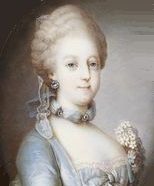
(caroline2.jpg)
She was a sister of Great Britain's King George III, who was anxious about the marriage but not fully aware that the bridegroom was mentally ill.
The dynastic marriage took place at Christiansborg Palace on 8 November 1766, the same year as the groom's coronation.
After his marriage, he abandoned himself to the worst excesses, especially sexual promiscuity.
In 1767, he entered into a relationship with the courtesan Støvlet-Cathrine.
He publicly declared that he could not love Caroline Matilda, because it was "unfashionable to love one's wife".
He ultimately sank into a condition of mental stupor.
Symptoms during this time included paranoia, self-mutilation and hallucinations.
Struensee

(struensee2.jpg)
He became submissive to the progressive and radical thinker Johann Friedrich Struensee, his personal physician, who rose steadily in power in the late 1760s, to a "de facto" regent of the country, where he introduced widespread progressive reforms.
Struensee was a protégé of an Enlightenment circle of aristocrats that had been rejected by the court in Copenhagen.
He was a skilled doctor.
Having somewhat restored the king's health while visiting the Schleswig-Holstein area, he gained the king's affection.
He was retained as travelling physician ("Livmedikus hos Kong Christian VII") on 5 April 1768, and accompanied the entourage on the King’s foreign tour to Paris and London via Hannover from 6 May 1768 to 12 January 1769.
He was given the title of State Councilor ("etatsråd") on 12 May 1768, barely a week after leaving Altona.
The neglected and lonely Caroline Matilda drifted into an affair with Struensee.
Divorce
In 1772, the king's marriage with Caroline Matilda was dissolved by divorce.
Struensee, following a deluge of modernising and emancipating reforms, was arrested and executed the same year.
Christian signed Struensee's arrest and execution warrant under pressure from his stepmother, Queen Juliane Marie, who had led the movement to have the marriage ended.

(struenseex.gif)
Caroline Matilda, retaining her title but not her children, eventually left Denmark in exile and passed her remaining days at Celle Castle in her brother's German territory, the Electorate of Hanover.
She died there of scarlet fever on 10 May 1775, at the age of 23.
Christian's marriage with Caroline Matilda produced two children: the future King Frederick VI and Princess Louise Auguste.
However, it is widely believed that Louise was the daughter of Struensee—portrait comparisons tend to support this hypothesis.
Later life
Christian was only nominally king from 1772 onwards.
Between 1772 and 1784, Denmark was ruled by Christian's stepmother Queen Dowager Juliane Marie, his half-brother Frederick and the Danish politician Ove Høegh-Guldberg.
From 1784 onwards, his son Frederick VI ruled permanently as a prince regent.
This regency was marked by liberal and agricultural reforms, but also by the beginning of the disasters of the Napoleonic Wars.
Death and succession
Christian died at age 59 of a stroke on 13 March 1808 in Rendsburg, Schleswig.
Rumors began that the stroke was caused by fright at the sight of Spanish auxiliaries, which he took to be hostile, but Ulrik Langen, in his biography of the king, did not indicate that there was any external cause.
He was buried in Roskilde Cathedral and was succeeded by his son Frederick VI.
SOURCE: "Christian VII of Denmark"
From Wikipedia, the free encyclopedia

Kato, tell me. How come you think Christian VII was NOT really a mad man?

First of all, the earlier accounts say that Christian VII had a winning personality and considerable talent.
But, Kato, they also say, he was poorly educated, systematically terrorized by a brutal governor, the Count of Reventlow.
That's right. Christian VII might've looked like a mad man because he suffered from severe emotional problems caused by the brutal governor, I suppose. So he appeared to be a crazy man for the eyes of an unknowing person.
I see...
Secondly, in 1769 Christian VII invited the Hungarian astronomer Miksa Hell (Maximilian Hell) to Vardø, a town and the administrative centre of Vardø Municipality in Finnmark county, Norway.
How come?
Obviously, Christian VII was interested in astronomy. Otherwise, he wouldn't invite the astronomer in the first place. This event clearly tells you that at the age of 20, Christian VII had a winning personality and considerable talent.
And what did the astronomer do in Norway?
He observed the transit of Venus, and his calculations gave the most precise calculation of the Earth–Sun distance to that date---approximately 151 million kilometres.
I see. So, Kato, you think that Christian VII was a man of some intelligence, don't you?
I suppose so. If Christian VII had been insane, he wouldn't have taken any interest in astronomy.
Then, how come people in those days considered him to be a mad man?
There are two reasons, I suppose. Firstly, Christian VII was a liberal man who hated a traditional way of life. In other words, he might have been considered a libertine. In this sense, Christian VII had been getting along quite well with Struensee, who was liberal-minded. Actually, Struensee introduced widespread progressive and liberal reforms such as:

(torture2.gif)
•abolition of torture
•abolition of unfree labor (corvée)
•abolition of the censorship of the press
•abolition of the practice of preferring nobles for state offices
•abolition of noble privileges
•abolition of "undeserved" revenues for nobles
•abolition of the etiquette rules at the Royal Court
•abolition of the Royal Court's aristocracy
•abolition of state funding of unproductive manufacturers
•abolition of several holidays
•introduction of a tax on gambling and luxury horses to fund nursing of foundlings
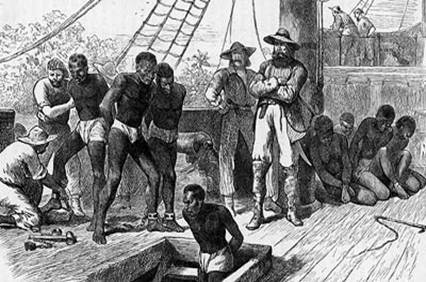
(slave80.jpg)
•ban of slave trade in the Danish colonies
•rewarding only actual achievements with feudal titles and decorations
•criminalization and punishment of bribery
•re-organization of the judicial institutions to minimize corruption
•introduction of state-owned grain storages to balance out the grain price
•assignment of farmland to peasants
•re-organization and reduction of the army
•university reforms
•reform of the state-owned medical institutions.

These are all admirable decisions even to the eyes of the present-day people like you and me.

I see... So, you think, Christian VII was a liberal-minded, rather modern man, huh?
That's right.
And what is the second reason for the king's insanity?
Well... The forbidden love between the queen and the king's personal phycisian was so scandalous that the Danish government might have made up a "reasonable and acceptable motive" for the queen to have relation with the other man.
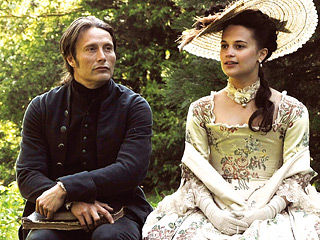
(royal003.jpg)

Kato, are you saying, the government told the citizens that the king was a mad man so that the neglected and lonely queen drifted into an affair with Struensee. Is that it?

Yes, I believe so. That's the reason people came to believe that the king was a mad man.

(laugh16.gif)
【Himiko's Monologue】

(himiko22.gif)
Wow! What a forbidden love it is!
The above movie shakes my back bone with thrill, excitenment and amazement.
How abou you?
Have you seen the above movie yet?
Are you afraid of viewing such a scandalous film?
Oh, well... there are some other interesting movies.
For example, look at Number 625 in the above list.
It is called "Russian Ark."
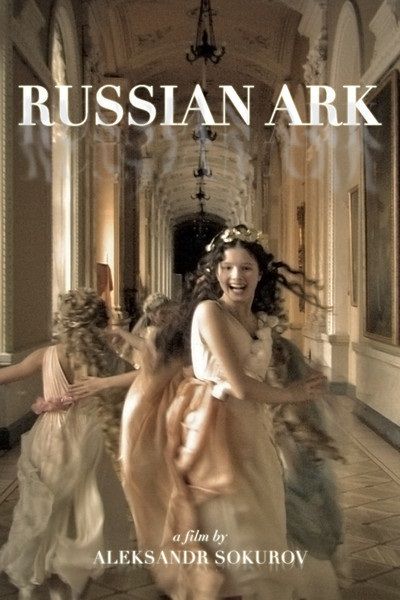
(russark2.jpg)
【Trailer】
【Full Movie】
Kato jotted down his comment as follows:
It is a 2002 historical drama directed by Alexander Sokurov.
It was filmed entirely in the Winter Palace of the Russian State Hermitage Museum using a single 96-minute Steadicam sequence shot.
An unnamed narrator wanders through the Winter Palace in Saint Petersburg.
He is accompanied by "the European", who represents the Marquis de Custine, a nineteenth-century French traveler.
The Marquis encounters various real and fictional people from various periods in the city's 300-year history.
You see Peter the Great harassing one of his generals.
Catherine the Great watches a spectacular presentation of opera and then rushes to take a pee.
You also see an imperial audience in which Tsar Nicholas I is offered a formal apology by the Shah of Iran for the death of Alexander Griboedov, an ambassador to Iran.
Followed is the idyllic family life of Tsar Nicholas II's children.
After that, a desperate Leningrader makes his own coffin during the 900-day siege of the city during World War II.
It is a magnificent and fascinating documentary-style presentation of Russian palace culture.
The above comment sounds quite interesting, doesn't it?
In any case, I hope Kato will write another interesting article soon.
So please come back to see me.
Have a nice day!
Bye bye ...

(hand.gif)

(renge400.jpg)
If you've got some time,
Please read one of the following artciles:

(juneswim.jpg)
■"Go Bananas"
■"Manwatching"
■"Stanley Boardwalk"
■"With Your Tiger"
■"A Second World"
■"Asexual Thought"

(biker302.jpg)
■"Stanley 125 Years"
■"Sushi @ the Globe"
■"Peace@Syria & Pentagon"
■"Sweet Memory"
■"Unforgettable Movies"
■"Typhoon 26"
■"Great Luck"
■"Diane@World"
■"Diane@Spam"
■"Sabina"
■"Happy New Year"
■"Merange & Sabina"
■"Beauty in Spa"
■"Love @ e-reading"
■"Troublesome Slang"
■"World Family"
■"Mari's Bagels"
■"Love & Loyalty"
■"Another Cinderella"
■"Amazing Two-legged Pooch"
■"Delusive Romance"
■"Royal Couple"
■"Life with Music"
■"Poutine@Canada"
■"Glorious Summer"
■"Biker Babe & Granny"
■"Genetically Modified"
■"Tyrannosaur"
■"Love@Magic"
■"Yellow Ball"
■"Welcome Back"

(surfin2.gif)

(bare02b.gif)
Hi, I'm June Adams.
I like animation, too.
For example, watch the above list in the article and look at Number 627, which is called "The Illusionist."

(illuanime2.jpg)
Kato jotted down his comment:
This is a 2010 British-French animation film directed by Sylvain Chomet.
The film is based on an unproduced script written by French mime, director and actor Jacques Tati in 1956.
Tati wrote the script of The Illusionist and intended to make it as a live action film with his daughter.
It was written as a personal letter to his estranged eldest daughter, Helga Marie-Jeanne Schiel, whom he had abandoned when she was a baby.
So, it's not a romance but more like the relationship between a dad and a daughter.
In the film Alice discovers the affection of a handsome young man.
Once the illusionist sees them walking together, he opts to leave her with money and move on.
His final message is a letter that says "Magicians do not exist."
Alice subsequently moves in with her new boyfriend.
The illusionist releases the rabbit on the verdant hillside of Arthur's Seat, where many other rabbits are seen.
To the eyes of the illusioninst, therefore, Alice and the rabbit are the same.
He sets both of them free.
It is a tender, contemplative and somewhat poetic film.
...sounds interesting, doesn't it?
Why don't you see it?
ところで、愛とロマンに満ちた
レンゲさんのお話をまとめて
『レンゲ物語』を作りました。
もし、レンゲさんの記事をまとめて読みたいならば、
次のリンクをクリックしてくださいね。
■『愛とロマンのレンゲ物語』

(renge730.jpg)
■『軽井沢タリアセン夫人 - 小百合物語』
とにかく、今日も一日楽しく愉快に
ネットサーフィンしましょうね。
じゃあね。

(bikini901b.jpg)

(dogs17.gif)

(girlxx.gif)